Impact of Stress on Health: A Nursing Perspective on Single Parents
VerifiedAdded on 2023/06/11
|6
|1699
|295
Essay
AI Summary
This nursing essay examines the multifaceted challenges faced by single working parents, particularly focusing on how stress impacts their overall health and well-being. It highlights the emotional, social, and economic stressors that single parents encounter, referencing a case study to illustrate these difficulties. The essay further delves into the role of stress in causing illness, detailing how the body responds to stress and the potential health complications that can arise, including mental health issues, cardiovascular problems, and substance abuse. It emphasizes the importance of adopting healthy coping strategies to manage stress effectively. Desklib offers a wealth of similar resources for students seeking academic support and solved assignments.
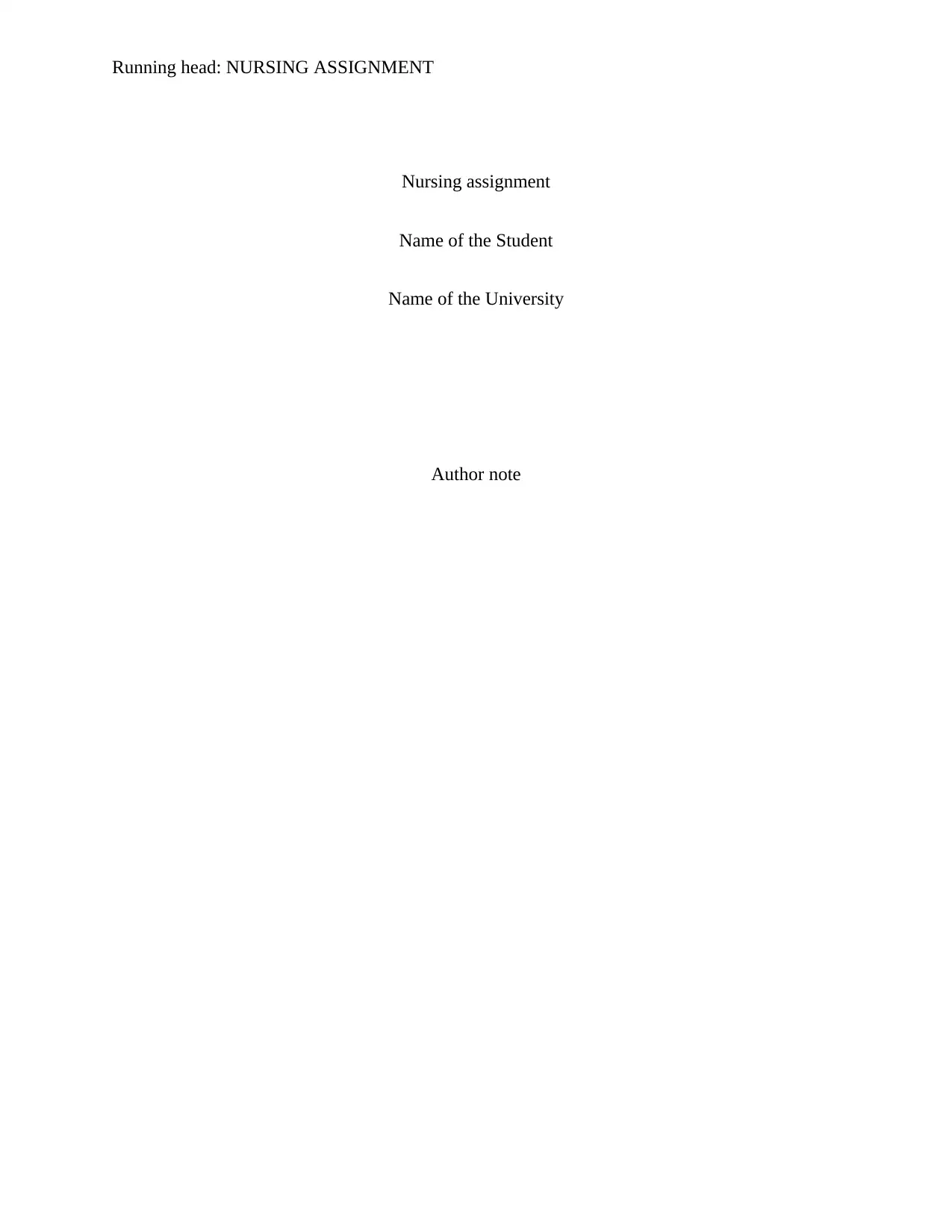
Running head: NURSING ASSIGNMENT
Nursing assignment
Name of the Student
Name of the University
Author note
Nursing assignment
Name of the Student
Name of the University
Author note
Paraphrase This Document
Need a fresh take? Get an instant paraphrase of this document with our AI Paraphraser
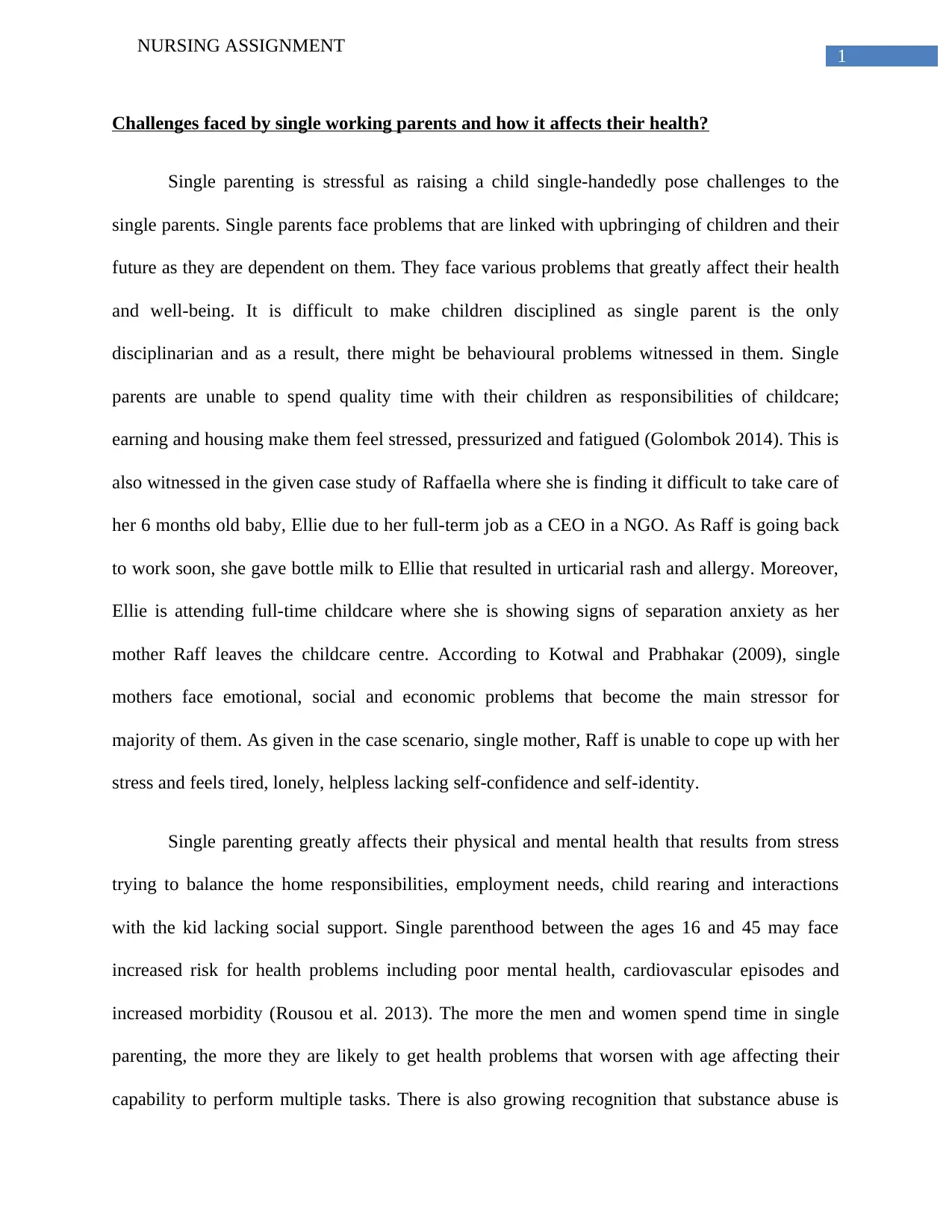
1
NURSING ASSIGNMENT
Challenges faced by single working parents and how it affects their health?
Single parenting is stressful as raising a child single-handedly pose challenges to the
single parents. Single parents face problems that are linked with upbringing of children and their
future as they are dependent on them. They face various problems that greatly affect their health
and well-being. It is difficult to make children disciplined as single parent is the only
disciplinarian and as a result, there might be behavioural problems witnessed in them. Single
parents are unable to spend quality time with their children as responsibilities of childcare;
earning and housing make them feel stressed, pressurized and fatigued (Golombok 2014). This is
also witnessed in the given case study of Raffaella where she is finding it difficult to take care of
her 6 months old baby, Ellie due to her full-term job as a CEO in a NGO. As Raff is going back
to work soon, she gave bottle milk to Ellie that resulted in urticarial rash and allergy. Moreover,
Ellie is attending full-time childcare where she is showing signs of separation anxiety as her
mother Raff leaves the childcare centre. According to Kotwal and Prabhakar (2009), single
mothers face emotional, social and economic problems that become the main stressor for
majority of them. As given in the case scenario, single mother, Raff is unable to cope up with her
stress and feels tired, lonely, helpless lacking self-confidence and self-identity.
Single parenting greatly affects their physical and mental health that results from stress
trying to balance the home responsibilities, employment needs, child rearing and interactions
with the kid lacking social support. Single parenthood between the ages 16 and 45 may face
increased risk for health problems including poor mental health, cardiovascular episodes and
increased morbidity (Rousou et al. 2013). The more the men and women spend time in single
parenting, the more they are likely to get health problems that worsen with age affecting their
capability to perform multiple tasks. There is also growing recognition that substance abuse is
NURSING ASSIGNMENT
Challenges faced by single working parents and how it affects their health?
Single parenting is stressful as raising a child single-handedly pose challenges to the
single parents. Single parents face problems that are linked with upbringing of children and their
future as they are dependent on them. They face various problems that greatly affect their health
and well-being. It is difficult to make children disciplined as single parent is the only
disciplinarian and as a result, there might be behavioural problems witnessed in them. Single
parents are unable to spend quality time with their children as responsibilities of childcare;
earning and housing make them feel stressed, pressurized and fatigued (Golombok 2014). This is
also witnessed in the given case study of Raffaella where she is finding it difficult to take care of
her 6 months old baby, Ellie due to her full-term job as a CEO in a NGO. As Raff is going back
to work soon, she gave bottle milk to Ellie that resulted in urticarial rash and allergy. Moreover,
Ellie is attending full-time childcare where she is showing signs of separation anxiety as her
mother Raff leaves the childcare centre. According to Kotwal and Prabhakar (2009), single
mothers face emotional, social and economic problems that become the main stressor for
majority of them. As given in the case scenario, single mother, Raff is unable to cope up with her
stress and feels tired, lonely, helpless lacking self-confidence and self-identity.
Single parenting greatly affects their physical and mental health that results from stress
trying to balance the home responsibilities, employment needs, child rearing and interactions
with the kid lacking social support. Single parenthood between the ages 16 and 45 may face
increased risk for health problems including poor mental health, cardiovascular episodes and
increased morbidity (Rousou et al. 2013). The more the men and women spend time in single
parenting, the more they are likely to get health problems that worsen with age affecting their
capability to perform multiple tasks. There is also growing recognition that substance abuse is
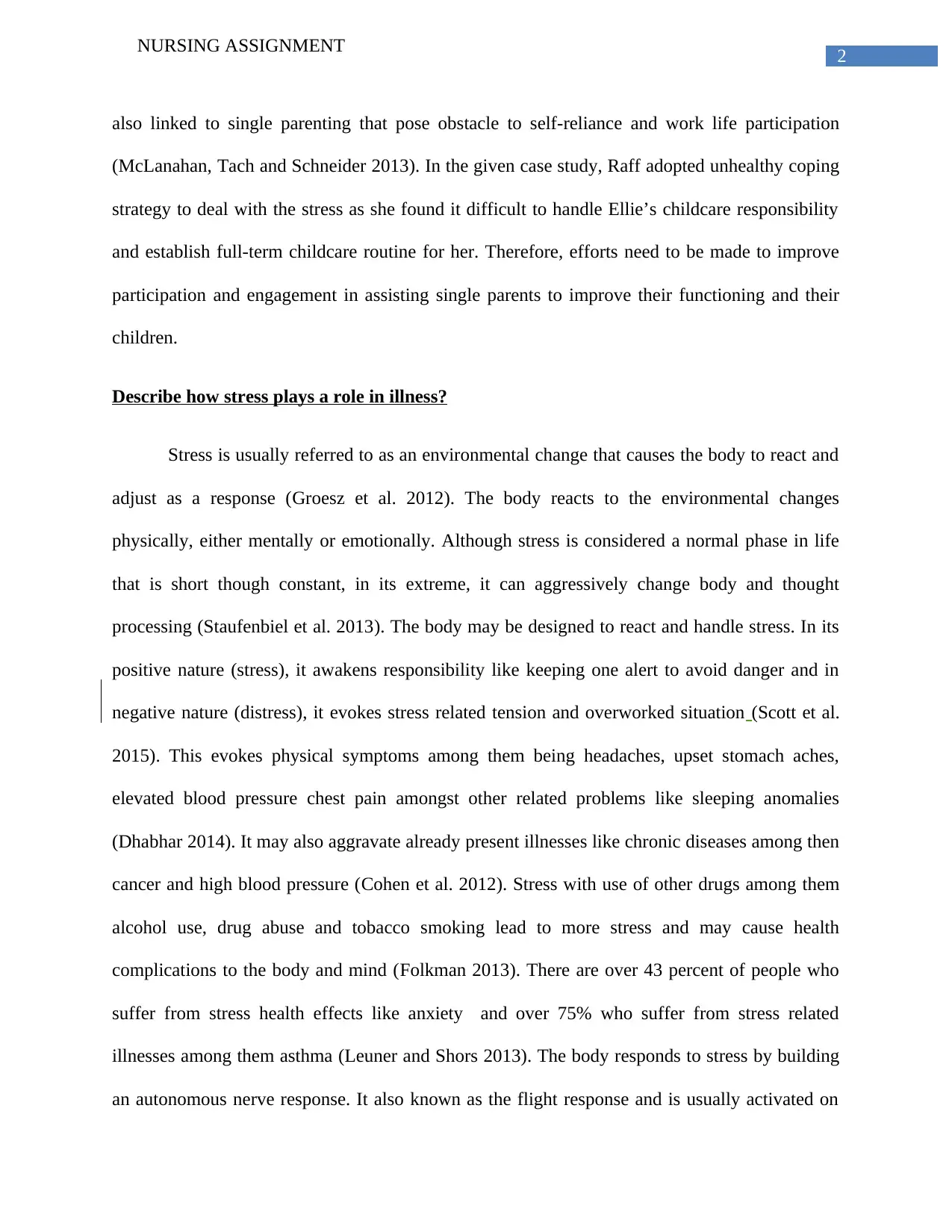
2
NURSING ASSIGNMENT
also linked to single parenting that pose obstacle to self-reliance and work life participation
(McLanahan, Tach and Schneider 2013). In the given case study, Raff adopted unhealthy coping
strategy to deal with the stress as she found it difficult to handle Ellie’s childcare responsibility
and establish full-term childcare routine for her. Therefore, efforts need to be made to improve
participation and engagement in assisting single parents to improve their functioning and their
children.
Describe how stress plays a role in illness?
Stress is usually referred to as an environmental change that causes the body to react and
adjust as a response (Groesz et al. 2012). The body reacts to the environmental changes
physically, either mentally or emotionally. Although stress is considered a normal phase in life
that is short though constant, in its extreme, it can aggressively change body and thought
processing (Staufenbiel et al. 2013). The body may be designed to react and handle stress. In its
positive nature (stress), it awakens responsibility like keeping one alert to avoid danger and in
negative nature (distress), it evokes stress related tension and overworked situation (Scott et al.
2015). This evokes physical symptoms among them being headaches, upset stomach aches,
elevated blood pressure chest pain amongst other related problems like sleeping anomalies
(Dhabhar 2014). It may also aggravate already present illnesses like chronic diseases among then
cancer and high blood pressure (Cohen et al. 2012). Stress with use of other drugs among them
alcohol use, drug abuse and tobacco smoking lead to more stress and may cause health
complications to the body and mind (Folkman 2013). There are over 43 percent of people who
suffer from stress health effects like anxiety and over 75% who suffer from stress related
illnesses among them asthma (Leuner and Shors 2013). The body responds to stress by building
an autonomous nerve response. It also known as the flight response and is usually activated on
NURSING ASSIGNMENT
also linked to single parenting that pose obstacle to self-reliance and work life participation
(McLanahan, Tach and Schneider 2013). In the given case study, Raff adopted unhealthy coping
strategy to deal with the stress as she found it difficult to handle Ellie’s childcare responsibility
and establish full-term childcare routine for her. Therefore, efforts need to be made to improve
participation and engagement in assisting single parents to improve their functioning and their
children.
Describe how stress plays a role in illness?
Stress is usually referred to as an environmental change that causes the body to react and
adjust as a response (Groesz et al. 2012). The body reacts to the environmental changes
physically, either mentally or emotionally. Although stress is considered a normal phase in life
that is short though constant, in its extreme, it can aggressively change body and thought
processing (Staufenbiel et al. 2013). The body may be designed to react and handle stress. In its
positive nature (stress), it awakens responsibility like keeping one alert to avoid danger and in
negative nature (distress), it evokes stress related tension and overworked situation (Scott et al.
2015). This evokes physical symptoms among them being headaches, upset stomach aches,
elevated blood pressure chest pain amongst other related problems like sleeping anomalies
(Dhabhar 2014). It may also aggravate already present illnesses like chronic diseases among then
cancer and high blood pressure (Cohen et al. 2012). Stress with use of other drugs among them
alcohol use, drug abuse and tobacco smoking lead to more stress and may cause health
complications to the body and mind (Folkman 2013). There are over 43 percent of people who
suffer from stress health effects like anxiety and over 75% who suffer from stress related
illnesses among them asthma (Leuner and Shors 2013). The body responds to stress by building
an autonomous nerve response. It also known as the flight response and is usually activated on
⊘ This is a preview!⊘
Do you want full access?
Subscribe today to unlock all pages.

Trusted by 1+ million students worldwide
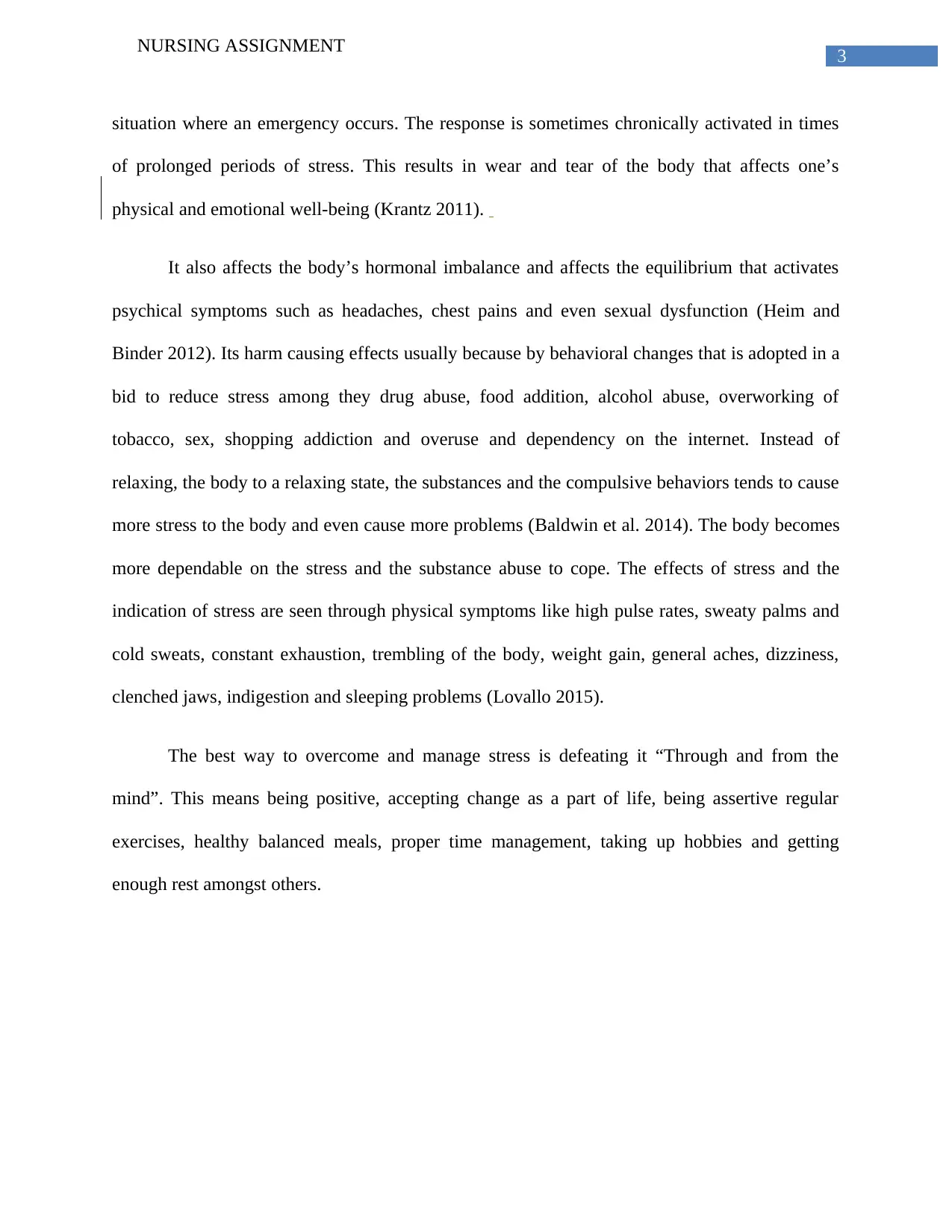
3
NURSING ASSIGNMENT
situation where an emergency occurs. The response is sometimes chronically activated in times
of prolonged periods of stress. This results in wear and tear of the body that affects one’s
physical and emotional well-being (Krantz 2011).
It also affects the body’s hormonal imbalance and affects the equilibrium that activates
psychical symptoms such as headaches, chest pains and even sexual dysfunction (Heim and
Binder 2012). Its harm causing effects usually because by behavioral changes that is adopted in a
bid to reduce stress among they drug abuse, food addition, alcohol abuse, overworking of
tobacco, sex, shopping addiction and overuse and dependency on the internet. Instead of
relaxing, the body to a relaxing state, the substances and the compulsive behaviors tends to cause
more stress to the body and even cause more problems (Baldwin et al. 2014). The body becomes
more dependable on the stress and the substance abuse to cope. The effects of stress and the
indication of stress are seen through physical symptoms like high pulse rates, sweaty palms and
cold sweats, constant exhaustion, trembling of the body, weight gain, general aches, dizziness,
clenched jaws, indigestion and sleeping problems (Lovallo 2015).
The best way to overcome and manage stress is defeating it “Through and from the
mind”. This means being positive, accepting change as a part of life, being assertive regular
exercises, healthy balanced meals, proper time management, taking up hobbies and getting
enough rest amongst others.
NURSING ASSIGNMENT
situation where an emergency occurs. The response is sometimes chronically activated in times
of prolonged periods of stress. This results in wear and tear of the body that affects one’s
physical and emotional well-being (Krantz 2011).
It also affects the body’s hormonal imbalance and affects the equilibrium that activates
psychical symptoms such as headaches, chest pains and even sexual dysfunction (Heim and
Binder 2012). Its harm causing effects usually because by behavioral changes that is adopted in a
bid to reduce stress among they drug abuse, food addition, alcohol abuse, overworking of
tobacco, sex, shopping addiction and overuse and dependency on the internet. Instead of
relaxing, the body to a relaxing state, the substances and the compulsive behaviors tends to cause
more stress to the body and even cause more problems (Baldwin et al. 2014). The body becomes
more dependable on the stress and the substance abuse to cope. The effects of stress and the
indication of stress are seen through physical symptoms like high pulse rates, sweaty palms and
cold sweats, constant exhaustion, trembling of the body, weight gain, general aches, dizziness,
clenched jaws, indigestion and sleeping problems (Lovallo 2015).
The best way to overcome and manage stress is defeating it “Through and from the
mind”. This means being positive, accepting change as a part of life, being assertive regular
exercises, healthy balanced meals, proper time management, taking up hobbies and getting
enough rest amongst others.
Paraphrase This Document
Need a fresh take? Get an instant paraphrase of this document with our AI Paraphraser
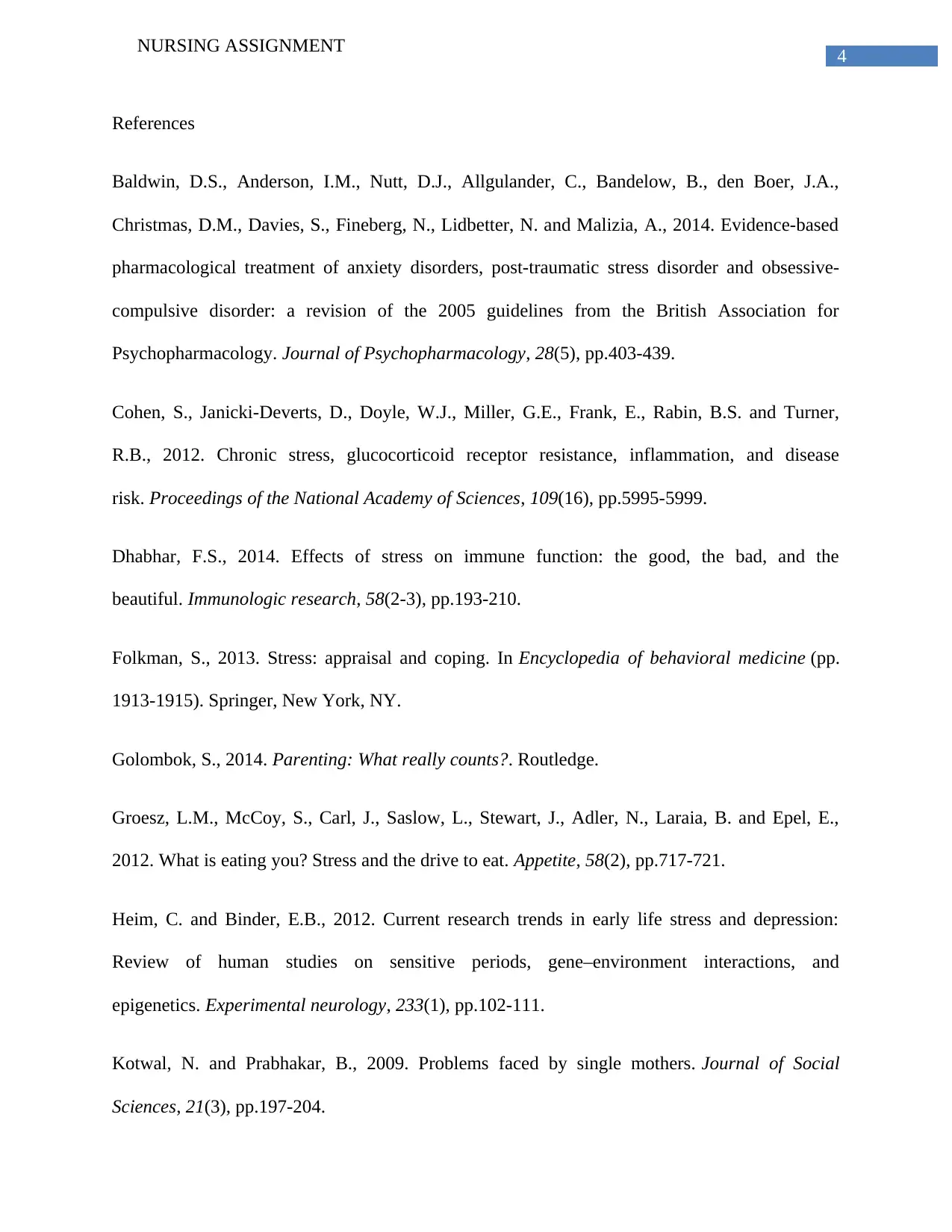
4
NURSING ASSIGNMENT
References
Baldwin, D.S., Anderson, I.M., Nutt, D.J., Allgulander, C., Bandelow, B., den Boer, J.A.,
Christmas, D.M., Davies, S., Fineberg, N., Lidbetter, N. and Malizia, A., 2014. Evidence-based
pharmacological treatment of anxiety disorders, post-traumatic stress disorder and obsessive-
compulsive disorder: a revision of the 2005 guidelines from the British Association for
Psychopharmacology. Journal of Psychopharmacology, 28(5), pp.403-439.
Cohen, S., Janicki-Deverts, D., Doyle, W.J., Miller, G.E., Frank, E., Rabin, B.S. and Turner,
R.B., 2012. Chronic stress, glucocorticoid receptor resistance, inflammation, and disease
risk. Proceedings of the National Academy of Sciences, 109(16), pp.5995-5999.
Dhabhar, F.S., 2014. Effects of stress on immune function: the good, the bad, and the
beautiful. Immunologic research, 58(2-3), pp.193-210.
Folkman, S., 2013. Stress: appraisal and coping. In Encyclopedia of behavioral medicine (pp.
1913-1915). Springer, New York, NY.
Golombok, S., 2014. Parenting: What really counts?. Routledge.
Groesz, L.M., McCoy, S., Carl, J., Saslow, L., Stewart, J., Adler, N., Laraia, B. and Epel, E.,
2012. What is eating you? Stress and the drive to eat. Appetite, 58(2), pp.717-721.
Heim, C. and Binder, E.B., 2012. Current research trends in early life stress and depression:
Review of human studies on sensitive periods, gene–environment interactions, and
epigenetics. Experimental neurology, 233(1), pp.102-111.
Kotwal, N. and Prabhakar, B., 2009. Problems faced by single mothers. Journal of Social
Sciences, 21(3), pp.197-204.
NURSING ASSIGNMENT
References
Baldwin, D.S., Anderson, I.M., Nutt, D.J., Allgulander, C., Bandelow, B., den Boer, J.A.,
Christmas, D.M., Davies, S., Fineberg, N., Lidbetter, N. and Malizia, A., 2014. Evidence-based
pharmacological treatment of anxiety disorders, post-traumatic stress disorder and obsessive-
compulsive disorder: a revision of the 2005 guidelines from the British Association for
Psychopharmacology. Journal of Psychopharmacology, 28(5), pp.403-439.
Cohen, S., Janicki-Deverts, D., Doyle, W.J., Miller, G.E., Frank, E., Rabin, B.S. and Turner,
R.B., 2012. Chronic stress, glucocorticoid receptor resistance, inflammation, and disease
risk. Proceedings of the National Academy of Sciences, 109(16), pp.5995-5999.
Dhabhar, F.S., 2014. Effects of stress on immune function: the good, the bad, and the
beautiful. Immunologic research, 58(2-3), pp.193-210.
Folkman, S., 2013. Stress: appraisal and coping. In Encyclopedia of behavioral medicine (pp.
1913-1915). Springer, New York, NY.
Golombok, S., 2014. Parenting: What really counts?. Routledge.
Groesz, L.M., McCoy, S., Carl, J., Saslow, L., Stewart, J., Adler, N., Laraia, B. and Epel, E.,
2012. What is eating you? Stress and the drive to eat. Appetite, 58(2), pp.717-721.
Heim, C. and Binder, E.B., 2012. Current research trends in early life stress and depression:
Review of human studies on sensitive periods, gene–environment interactions, and
epigenetics. Experimental neurology, 233(1), pp.102-111.
Kotwal, N. and Prabhakar, B., 2009. Problems faced by single mothers. Journal of Social
Sciences, 21(3), pp.197-204.
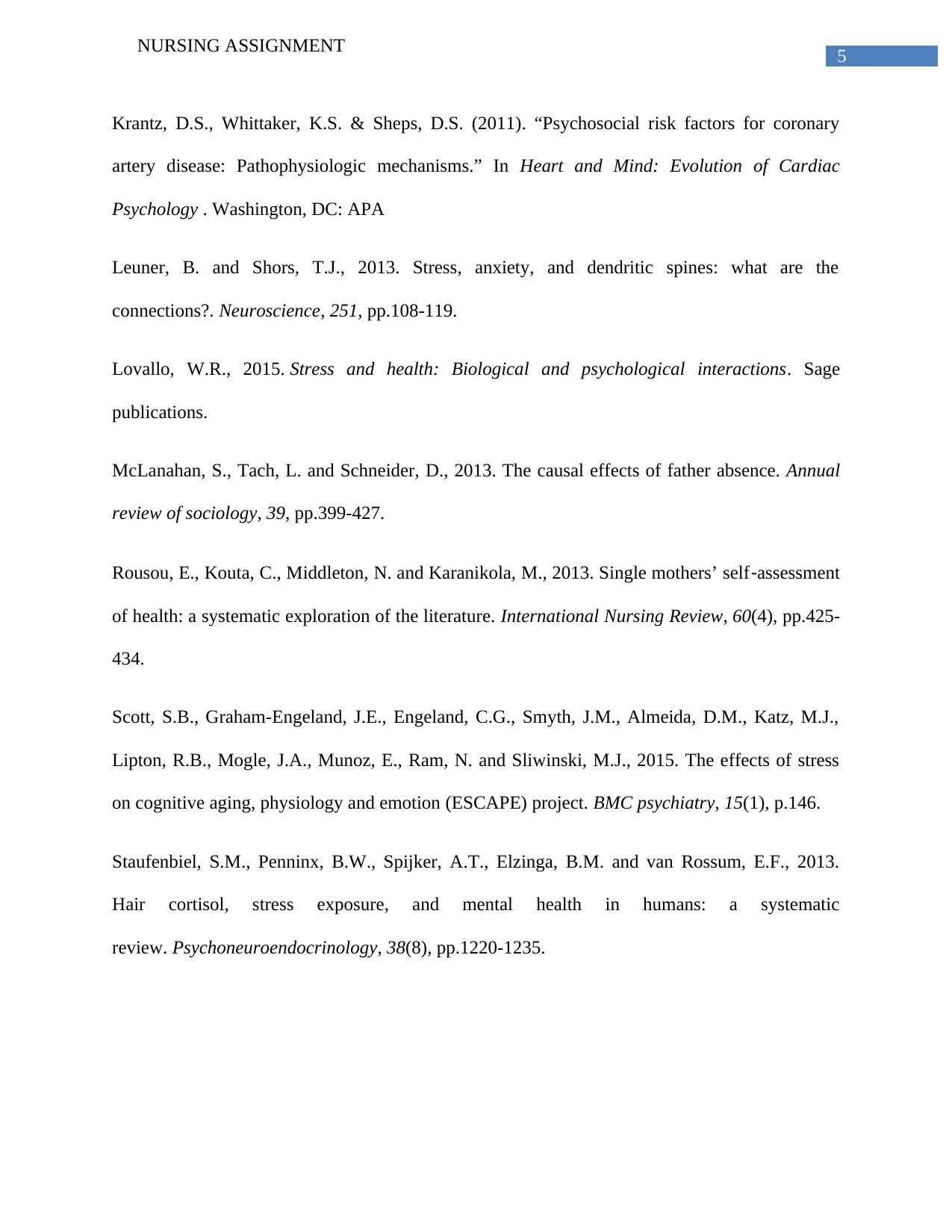
5
NURSING ASSIGNMENT
Krantz, D.S., Whittaker, K.S. & Sheps, D.S. (2011). “Psychosocial risk factors for coronary
artery disease: Pathophysiologic mechanisms.” In Heart and Mind: Evolution of Cardiac
Psychology . Washington, DC: APA
Leuner, B. and Shors, T.J., 2013. Stress, anxiety, and dendritic spines: what are the
connections?. Neuroscience, 251, pp.108-119.
Lovallo, W.R., 2015. Stress and health: Biological and psychological interactions. Sage
publications.
McLanahan, S., Tach, L. and Schneider, D., 2013. The causal effects of father absence. Annual
review of sociology, 39, pp.399-427.
Rousou, E., Kouta, C., Middleton, N. and Karanikola, M., 2013. Single mothers’ self‐assessment
of health: a systematic exploration of the literature. International Nursing Review, 60(4), pp.425-
434.
Scott, S.B., Graham-Engeland, J.E., Engeland, C.G., Smyth, J.M., Almeida, D.M., Katz, M.J.,
Lipton, R.B., Mogle, J.A., Munoz, E., Ram, N. and Sliwinski, M.J., 2015. The effects of stress
on cognitive aging, physiology and emotion (ESCAPE) project. BMC psychiatry, 15(1), p.146.
Staufenbiel, S.M., Penninx, B.W., Spijker, A.T., Elzinga, B.M. and van Rossum, E.F., 2013.
Hair cortisol, stress exposure, and mental health in humans: a systematic
review. Psychoneuroendocrinology, 38(8), pp.1220-1235.
NURSING ASSIGNMENT
Krantz, D.S., Whittaker, K.S. & Sheps, D.S. (2011). “Psychosocial risk factors for coronary
artery disease: Pathophysiologic mechanisms.” In Heart and Mind: Evolution of Cardiac
Psychology . Washington, DC: APA
Leuner, B. and Shors, T.J., 2013. Stress, anxiety, and dendritic spines: what are the
connections?. Neuroscience, 251, pp.108-119.
Lovallo, W.R., 2015. Stress and health: Biological and psychological interactions. Sage
publications.
McLanahan, S., Tach, L. and Schneider, D., 2013. The causal effects of father absence. Annual
review of sociology, 39, pp.399-427.
Rousou, E., Kouta, C., Middleton, N. and Karanikola, M., 2013. Single mothers’ self‐assessment
of health: a systematic exploration of the literature. International Nursing Review, 60(4), pp.425-
434.
Scott, S.B., Graham-Engeland, J.E., Engeland, C.G., Smyth, J.M., Almeida, D.M., Katz, M.J.,
Lipton, R.B., Mogle, J.A., Munoz, E., Ram, N. and Sliwinski, M.J., 2015. The effects of stress
on cognitive aging, physiology and emotion (ESCAPE) project. BMC psychiatry, 15(1), p.146.
Staufenbiel, S.M., Penninx, B.W., Spijker, A.T., Elzinga, B.M. and van Rossum, E.F., 2013.
Hair cortisol, stress exposure, and mental health in humans: a systematic
review. Psychoneuroendocrinology, 38(8), pp.1220-1235.
⊘ This is a preview!⊘
Do you want full access?
Subscribe today to unlock all pages.

Trusted by 1+ million students worldwide
1 out of 6
Related Documents
Your All-in-One AI-Powered Toolkit for Academic Success.
+13062052269
info@desklib.com
Available 24*7 on WhatsApp / Email
![[object Object]](/_next/static/media/star-bottom.7253800d.svg)
Unlock your academic potential
Copyright © 2020–2026 A2Z Services. All Rights Reserved. Developed and managed by ZUCOL.





